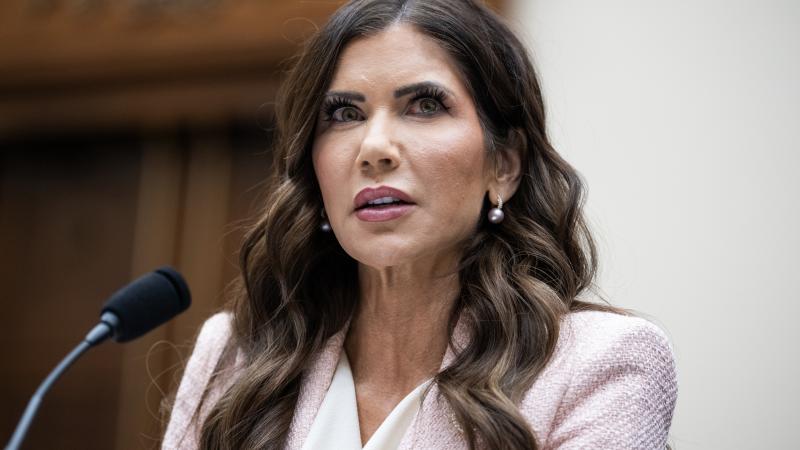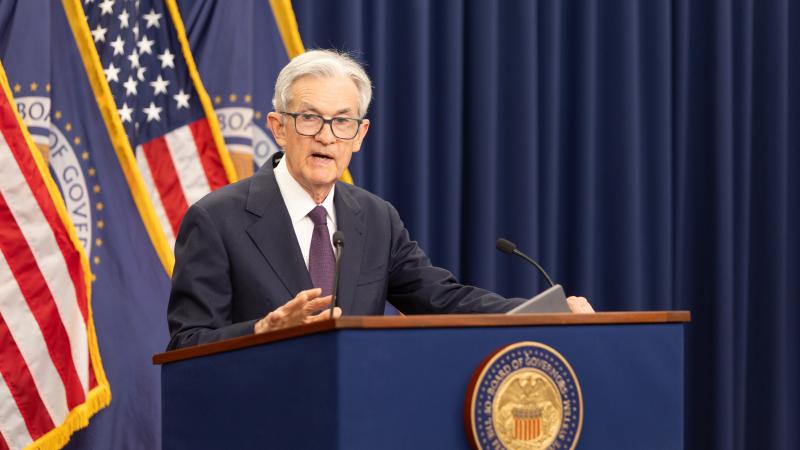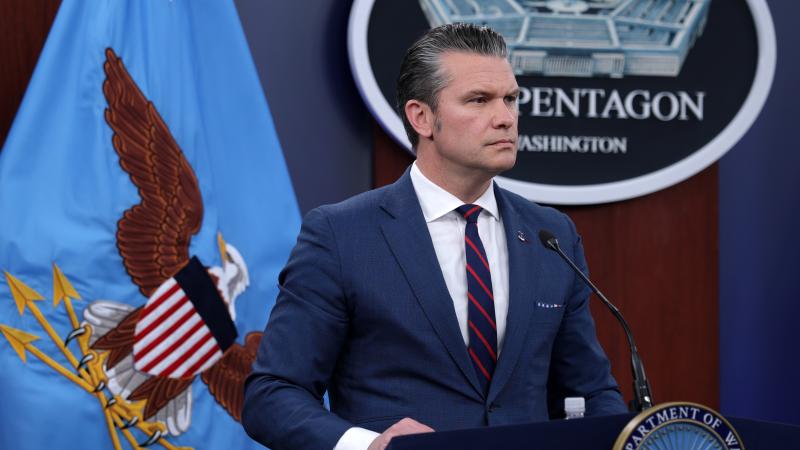DOJ to sit out whistleblower lawsuit accusing Pfizer of 'cutting corners' in COVID vaccine trial
Fired clinical trial employee for Pfizer contractor is represented by same lawyer behind Covington Catholic defamation suit.

The U.S. government is not getting directly involved in a whistleblower lawsuit alleging that Pfizer's COVID-19 vaccine clinical trials included fraud, though it might try to dismiss the lawsuit later.
The Justice Department, representing the FDA, filed a "notice of election to decline intervention" last month, more than a year after the suit was filed, but asked a federal judge to first get "written consent" from the feds if the parties want to dismiss or settle the case.
The government reserves the right to intervene at a later date in the False Claims Act lawsuit, which seeks to recover damages on its behalf and for the whistleblower, Brook Jackson.
Jackson accuses Pfizer and two contractors of "cutting corners in clinical trials" and falsifying clinical trial documents in their "race to secure billions in federal funding and become the first to market." The result, she claims, was millions of Americans receiving "a misbranded vaccination which is potentially not as effective as represented."
Pfizer delegated management of the worldwide clinical trial to Icon and hired Ventavia Research Group to run Phase 3 test sites in Texas. As Ventavia regional director, Jackson oversaw its trials in Fort Worth and Keller.
She internally aired her concerns, including ineligible trial participants, lack of informed consent, failure to preserve "blinding" and report adverse events, poor record-keeping, unqualified vaccinators, Health Insurance Portability and Accountability Act violations, "improperly dilut[ing]" the vaccine, and "deviations from recommended temperature," which is crucial for mRNA vaccines such as Pfizer's.
Ventavia "allowed the majority of violations to continue unabated" and fired Jackson hours after she called the FDA's hotline Sept. 25, 2020, to report trial protocol violations and patient safety concerns, the suit claims. When she told Pfizer, it responded by "expanding its trial to include even more participants."
While Jackson only witnessed misconduct in Texas, "Pfizer and Icon's oversight failures and fraudulent misconduct vis-a-vis Ventavia bring the entire Pfizer-BioNTech clinical trial into question," she claims.
"We are gratified the government has declined the case," Lauren Foreman, Ventavia director of business development and communications, wrote in an email to Just the News.
"Ms. Jackson worked for us for only 18 days and, as a result, did not complete the requisite training for the role for which she was hired. We are confident in our practices and procedures in conducting clinical trials, and, should her case move forward, we will respond to the litigation accordingly."
Pfizer and Icon didn't respond to Just the News queries. The Justice Department and the FDA both declined to explain why they aren't electing to participate in the case.
The case docket shows Jackson lost her Texas-based lawyers in October but got new representation two months later, led by Los Angeles-based Robert Barnes, who represented Covington Catholic students in a defamation lawsuit.
The Jackson suit isn't listed on Barnes' page for active cases, however. Neither he nor cocounsel Lexis Anderson responded to queries.
It's not clear whether the scope of the litigation has expanded. The Epoch Times reported last week that Jackson's unnamed lawyer threatened to sue Ventavia for defamation based on its characterization of her employment.
'Cleanup on aisle five'
On Feb. 10, U.S. District Judge Michael Truncale unsealed the January 2021 complaint and authorized Jackson to serve it on the defendants. Also made public: more than 400 pages of exhibits (1-10, 11-20, 20-29).
The Epoch Times, which posted the exhibits, said they show among other things that Pfizer was aware of the Ventavia problems. The FDA told the publication last year it has "full confidence in the data that were used to support" the emergency use authorization of Pfizer's vaccine and full approval of its branded vaccine Comirnaty.
At the request of the U.S., Truncale agreed to seal all other documents already in the court record but not those subsequently filed. Jackson, however, provided other non-public evidence to select journalists, including recordings of Ventavia meetings.
Paul Thacker, who previously investigated financial ties between physicians and pharmaceutical companies for the Senate Finance Committee, published an investigation in the British Medical Journal last fall.
In one recording, executives reportedly say Ventavia is finding "something new every day" in trial paperwork errors and dreading a possible FDA site visit. Another clinical trial veteran told Thacker that Ventavia was a "helter skelter" work environment and its data were a "crazy mess."
Journalist Matt Taibbi said he listened to a recording on which a Ventavia executive referred to its trial data problems as "cleanup on aisle five" and seemed to quiz Jackson about whether she had spilled the beans to outsiders.
Facebook throttled the BMJ report and warned users not to share it because the social media company's contracted fact-checker, Lead Stories, claimed the reporting would not "disqualify" the overall Pfizer COVID vaccine trial. Asked about possible litigation, BMJ recently told Just the News it was "considering all available options."
Thacker told Just the News that he could tell Pfizer's public relations team was feeding questions to other journalists, based on the inquiries he got. If his reporting were unverified, Pfizer would have sicced its army of lawyers on him, he argued.
D.C. lawyers know how careful he is, and he has more documentation than he has published, Thacker said.
He was primed to be skeptical of fact-checks by his previous BMJ investigation into how "contemporary science journalism" explained the wrongful designation of the COVID "lab leak" as a conspiracy theory for a year.
"I thought it was a joke at first" when Lead Stories faulted his report, which it erroneously described as a "blog," Thacker said. The fact-checker subsequently defended itself by claiming the BMJ report was misleading readers and being promoted by anti-vaccine pundits, and that Jackson "does not [personally] express unreserved support" for COVID vaccines.
Lead Stories specifically faulted BMJ for leading the report with Pfizer and referring to the company throughout, even though it documented problems at Ventavia. That's because Pfizer repeatedly designated the trial as "rigorous" despite its familiarity with Ventavia's problems, Thacker told Just the News.
He characterized "rigorous" as a mindless buzzword to defend COVID vaccine reviews, used by acting FDA Commissioner Janet Woodcock to approve Pfizer's vaccine for 5-11 year-olds. Surgeon General Vivek Murthy did the same when discussing why the FDA was reviewing a vaccine for younger children despite poor results from Pfizer's two-dose trial.
"It felt like you're watching the NBA Finals and suddenly one of the teams starts kicking the ball" like the Harlem Globetrotters, Thacker said, referring to Lead Stories' evolving explanations.
Jackson's claims are much more than "allegations," according to Thacker, backed by recordings, photographs, emails and other internal documents, including the FDA's formal response to her complaint.
He said Ventavia's initial response to the investigation, that Jackson wasn't part of the trial, is directly contradicted by a recording with a Pfizer official. "It's an old Eddie Murphy skit" where a boyfriend caught cheating tells his girlfriend "it wasn't me," Thacker said.
One of Jackson's claims is that Ventavia had too few employees to handle the volume of trial participants. Thacker said a second Ventavia whistleblower subsequently told him its trial actually had four times as many participants (4,000) as the company told the FDA in writing, roughly 10% of the total, but Thacker couldn't document this due to the alleged sloppiness of the data.
He's not sure about doing a followup on clinical trial problems despite having unpublished documentation. "What do you do next?" Thacker asked rhetorically. "The FDA doesn't care, and Pfizer keeps rolling."
The Facts Inside Our Reporter's Notebook
Documents
Links
- represented Covington Catholic students
- Barnes' page for active cases
- The Epoch Times
- January 2021 complaint
- 1-10
- 11-20
- 20-29
- investigation in the British Medical Journal
- Journalist Matt Taibbi
- Facebook throttled the BMJ report
- previous BMJ investigation
- acting FDA Commissioner Janet Woodcock
- Surgeon General Vivek Murthy
- despite poor results
- roughly 10% of the total















